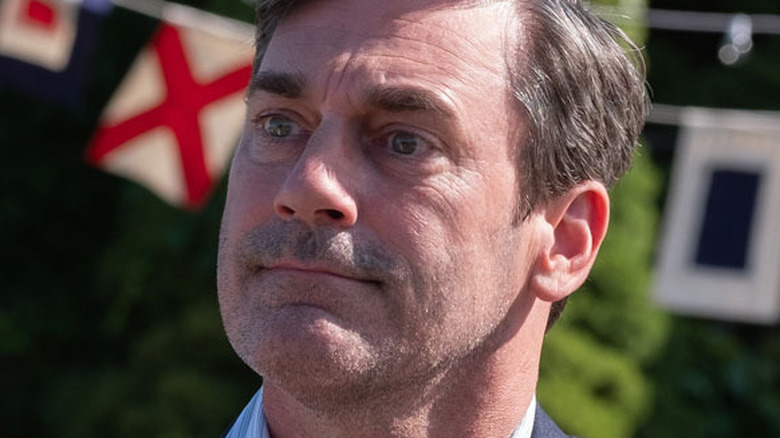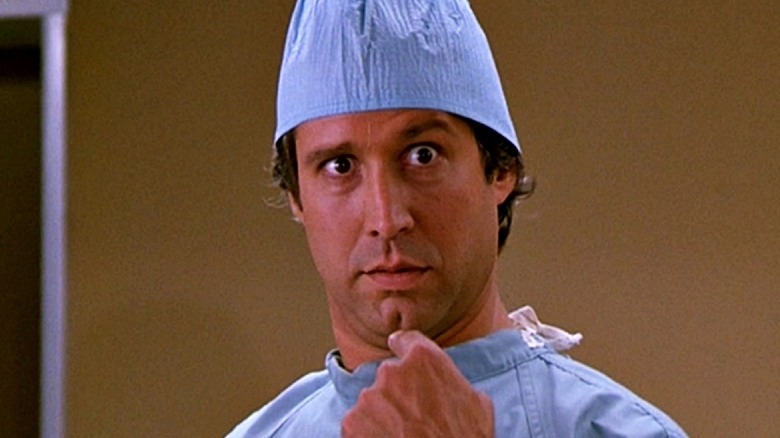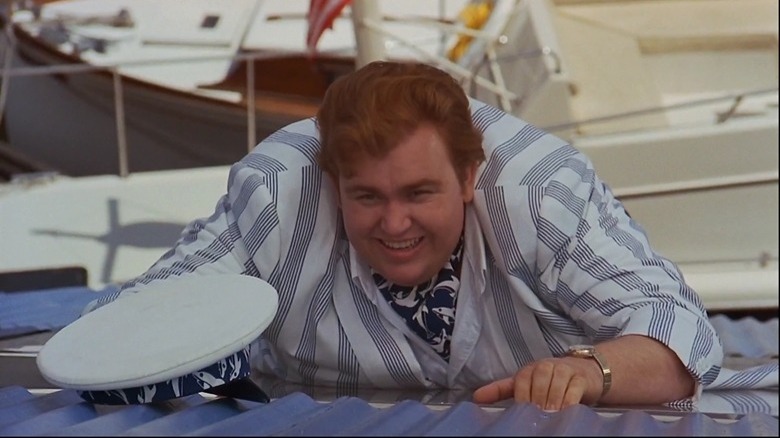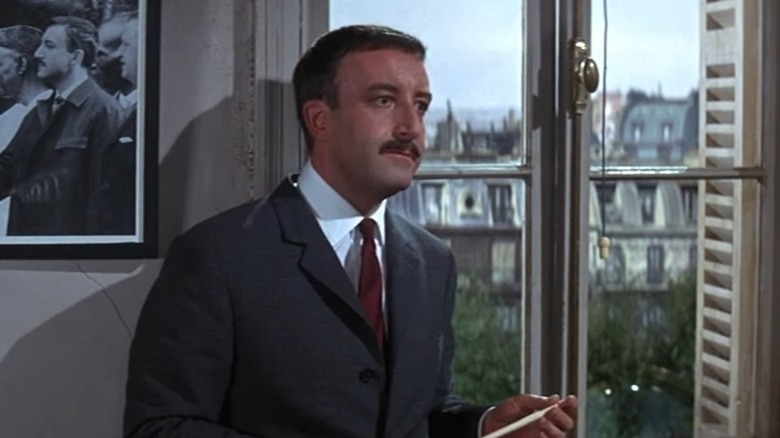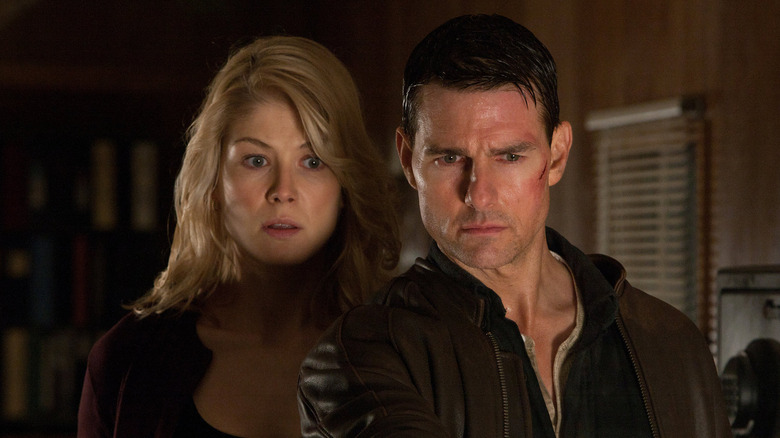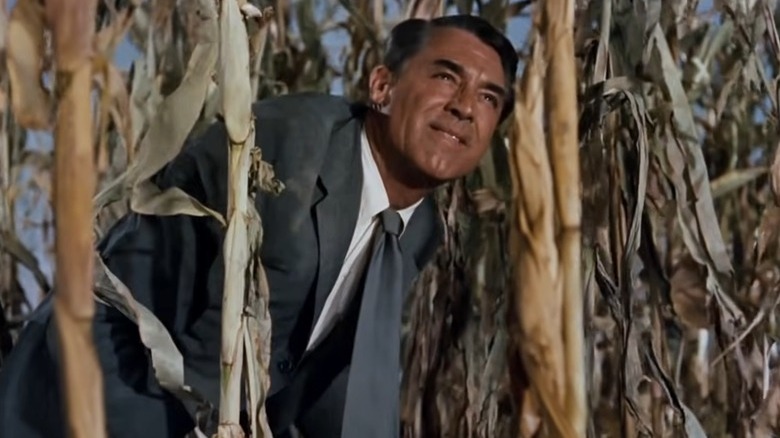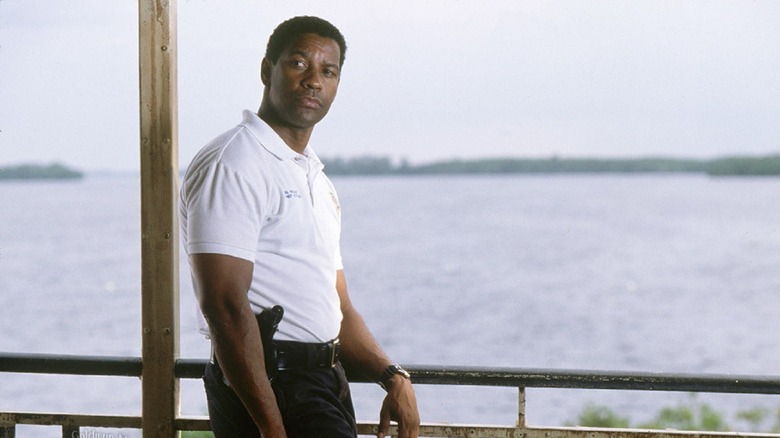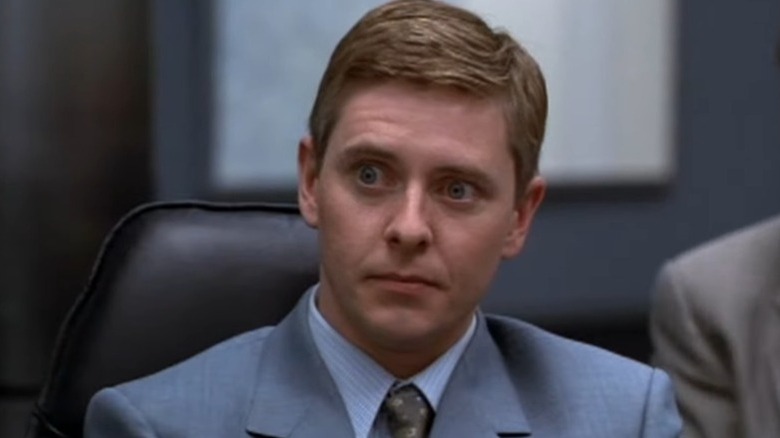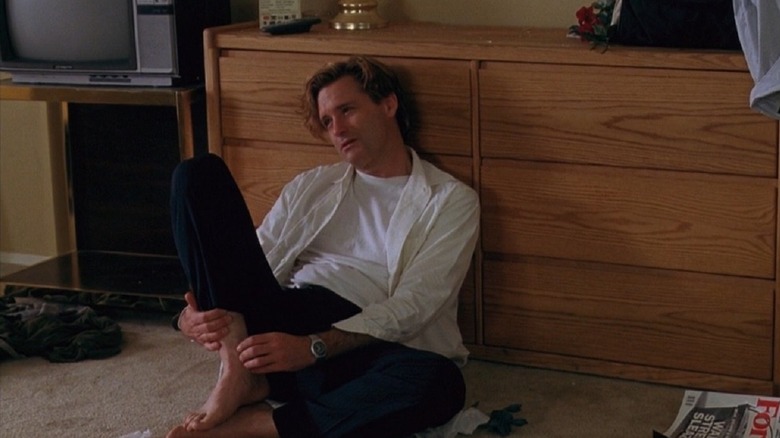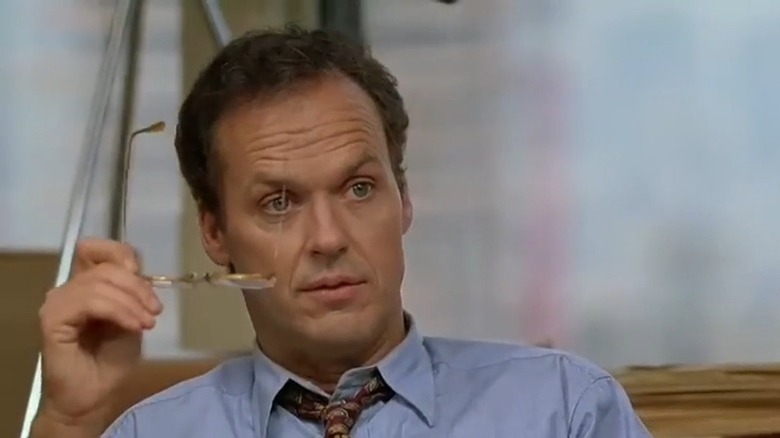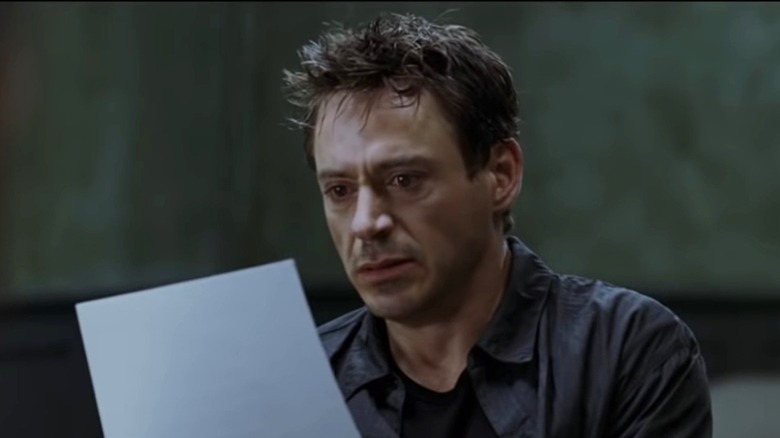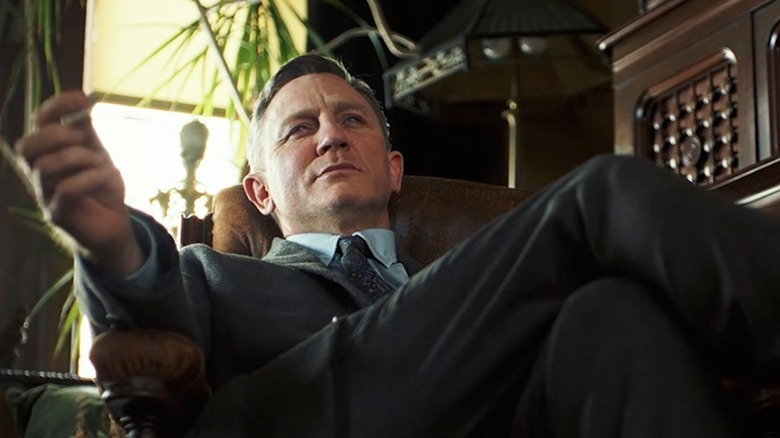12 Best Movies Like Confess, Fletch You Should Watch Next
Irwin Maurice Fletcher (Jon Hamm) may not be a fan of his full name — he'd just assume you call him "Fletch," thanks — but he sure seems a fan of himself. A master of conversational jiu-jitsu, Fletch has never encountered a statement from someone else he couldn't twist to his own ends...or at least make sillier.
In "Confess, Fletch," the former "investigative reporter of some renowned" stumbles into quite the minefield when he discovers the body of a woman in an apartment he is renting while on another job in Boston. Immediately, the number one suspect in the eyes of Inspector Detective Monroe (Roy Wood Jr.) and Junior Detective Griz (Ayden Mayeri), Fletch's situation only grows direr when photographic evidence seemingly unravels his alibi.
Meanwhile, there's the case that brought him to Boston in the first place: searching for a rare Picasso. He needs it — or rather, his girlfriend Angela (Lorenza Izzo) needs it — to pay the ransom for Count Clementi Arbogastes De Grassi (Robert Picardo). And things only get more confusing when the two cases start to connect in troubling ways.
While Fletch is one of a kind — ask, he'll tell you — there are several films you'll want to watch next if you find yourself a fan of the film's mix of multilayered mystery and consistent comic chatter. Here are the 12 best pics to check out after you watch "Confess, Fletch."
Fletch
Before Jon Hamm's turn as the character, Chevy Chase brought Gregory Mcdonald's wisecracking journalist to the big screen in 1985's "Fletch." Based on Mcdonald's first novel starring the character, which sports the same eponymous title, Chase authored a comparatively more antic interpretation of Fletch than Hamm's perpetually laid-back version. Nonetheless, much of what people appreciated in Hamm's work is also in Chase's. His Fletch is always quick with a comeback and a different identity while being fearless in violating social norms to get what he needs and wants.
In this tale, wealthy businessman Alan Stanwyk (Tim Matheson) approaches Fletch with a lucrative but strange request. Claiming to be dying of bone cancer, Stanwyck has no hope of recovery or a cure. As a result, he wants Fletch to kill him to avoid the inevitable pain of a slow succumbing to the disease and is willing to pay $50,000 for the service. While Fletch agrees, he doesn't trust that Stanwyk is being honest. His investigation confirms there is more to Stanwyk's motivation, but it's far more than even Fletch suspected.
Like "Confess, Fletch," this showcase for the character rests on twin mysteries — the other involves drug running on a Los Angeles beach — that connect unexpectedly. "Fletch" also reveals the reporter's impressive gift for flirtation and stepping on as many toes as possible. In both films, he appears to especially delight in making the lives of local police as frustrating as possible.
Who's Harry Crumb?
If Fletch is the smoothest guy on the block, Harry Crumb (John Candy) is his clumsier, less smug cousin. Still, they share plenty of "skills" in common, including a total absence of embarrassment, a love of switching identities, a gift for gab, and a tremendous reserve that somehow keeps them coming out on top.
Candy has a blast playing the world's least competent private investigator who still always manages to get the job done. In the film, unknown assailants have kidnapped millionaire P.J. Downing's (Barry Corbin) daughter Jennifer (Renée Coleman). Understandably desperate to have her returned, Downing reaches out to his friend Eliot's detective agency, Crumb & Crumb. Secretly behind the conspiracy, Eliot assigns Harry, the last living Crumb, to the case. Eliot anticipates Crumb's reputation for incompetence will ensure that Downing will eventually have no choice but to pay the ransom.
Besides the lead characters' shared personality traits, both the "Fletch" films and "Crumb" share a skepticism of elites — especially moneyed ones. Here they are all either corrupt, cheating on another, or too dumb to realize everyone else is up to the first two. Detective Casey (Valri Bromfield), the experienced cop assigned to the case, is the only person with any kind of power portrayed as possessing decency. She resents Crumb's presence, but when he manages to stumble his way into blowing the conspiracy open, she's kind enough to applaud his successful (despite his own) efforts.
Detective Pikachu
One may not look at Jon Hamm and immediately think of a one-and-a-quarter-foot tall electric rodent, but a closer look at the 2019 film reveals that "Detective Pikachu" is an excellent chaser for "Confess, Fletch."
The film — an adaptation of a video game of the same name — focuses on Tim Goodman's (Justice Smith) trip to Ryme City after receiving word of his father Harry's apparent demise. Tim has long been estranged from his dad and plans just to take care of the logistics before returning home. However, he encounters his dad's partner, the titular Pokemon investigator (featuring the silken vocal stylings of Ryan Reynolds), who insists that Harry is still alive. As with "Confess, Fletch," the mystery of Harry's fate quickly reveals itself to connect with a far larger and more complex criminal conspiracy that may even reach the family of Ryme City's founder Howard Clifford (Bill Nighy).
"Pikachu," however, alters the typical dynamics of a "Fletch" film. Instead of placing the Fletch-esque Pikachu in the center of the film's narrative, he plays the cute, furry sidekick to straight man Tim. The shift lets audiences better understand both the people that would fall for such an unrelentingly smooth joke machine and those who would be immediately allergic to such a figure. Think of it as "kiddo's first 'Fletch'" with plenty for adults to appreciate, too.
A Shot In the Dark
If a viewer is searching for the daddy of modern comedy mysteries, they could do much worse than settling on the films of Inspector Clouseau (Peter Sellers). Sellers renders Clouseau a ridiculous figure, fully assured of his talents while outclassed by nearly everyone around him, especially his manservant Cato (Burt Kwouk). Still, via his blissful lack of awareness, Clouseau manages to repeatedly unravel whatever case he's sets his mind to. Yes, he may not always realize that he's solved it, but somehow, at the end of the day, he still has.
In "A Shot in the Dark," Sellers gets arguably the biggest showcase for his talents of all the so-called "Pink Panther" films, resulting in what is likely Closeau's best outing. The mystery revolves around Clouseau being called to the country estate of Benjamin Ballon (George Sanders). While Ballon and his bored wealthy guests played the games of bored wealthy people, a gunshot rang out. Eventually, the party discovers the chauffeur's body. All evidence points to Maria (Elke Sommer), the maid, being the culprit, including the fact that she's found clutching the murder weapon.
Clouseau, however, insists on her innocence. As the bodies pile up and the Inspector himself is the subject of multiple attempts on his life, his hunch seems increasingly incorrect. Can he prove his point before he ends up on the slab? Or was it Maria from the start?
Jack Reacher
As the audience sees at the end of "Confess, Fletch," the former investigative journalist isn't one to hang around. Instead, in both his film and book appearances, he tends to show up, solve the crime(s), and see the guilty disciplined while the good are rewarded. Then, as the dust settles, he beats feet to some new exotic locale — with a bit of cash and/or treasure in hand for his trouble, of course.
Jack Reacher (Tom Cruise), the former military police officer turned wandering granite block of vengeance, isn't much for treasure or exotic locales. However, he does love to show up, stir things up, punish the wicked, protect the innocent, and then move on down the road. In this way, he's like Fletch — only. a humorless Fletch who barely has an identity, never mind a whole set of them.
In Reacher's titular first cinematic endeavor, adapted from Lee Child's novel "One Shot," a man accused of multiple murders, James Barr (Joseph Sikora), requests the police "Get Jack Reacher." Reacher has no love for Barr, having tried to see him prosecuted when both were in the armed services. However, Jack is also reasonably sure that the former sniper is not guilty of this crime.
Cruise's charisma goes a long way, even when purposely tamped down for the role. Having Werner Herzog as the strange head antagonist Zek Chelovek (whose name translates, basically, into "human prisoner") puts things over the top, making "Jack Reacher" an unexpectedly fascinating action film.
North by Northwest
While Fletch would likely never admit it, he probably does believe himself to be a bit of a Roger Thornhill (Cary Grant), the "genuine idiot" from "North by Northwest." Like Fletch, Thornhill is a silver-tongued charmer who has spent most of his life talking himself in and out of trouble when his good looks don't get the job done.
"North by Northwest" is a "wrong man" style noir, a genre that "Confess, Fletch" offers a comedic spin on. Thornhill accidentally inserts himself into spy games when he gets himself confused for "George Kaplan," the undercover identity of a U.S. spy. After getting kidnapped and nearly killed, Thornhill can't leave well enough alone, so he sets out to figure out the identity of the real George Kaplan. Unfortunately, his impeccable timing gets him to a murder scene just in time for someone to snap a photo of him holding a knife, implicating him in the crime. So he's worked himself into a double "wrong man" situation.
Although "North by Northwest" is undoubtedly best known for either its scene depicting Cary Grant's Thornhill being menaced by a crop duster or the Mount Rushmore action climax, the film's gift for comedy, especially early on, often ends up forgotten. Grant makes Thornhill funny when he's in his native element as an ad exec and even more amusing when as a man sinking deeper into a situation he can't solve and yet continue to act as though he stands a chance.
Out of Time
If you want to see what happens to a Fletch type in a fully serious "wrong man" noir, "Out of Time" offers a great modern take on that material. Denzel Washington plays "Matt Lee Whitlock," a small-town sheriff in Florida. While once well-respected, he's become increasingly slick and disconnected in the wake of his marriage to Alex (Eva Mendes) falling apart. Worse, he decided to rebound from that by having an affair with Ann (Sanaa Lathan) behind her husband Chris' (Dean Cain) back.
When she reveals she's dying of cancer, Matt suggests she undergo an experimental course of treatment overseas. She doesn't have the money to do it, but he takes nearly $500,000 from evidence and gives it to her. However, later that day, a house fire seems to consume her, Chris, and the money. With the feds coming down to collect the seized (and now scorched) cash, Matt's presence on Ann's life insurance policy makes him a suspect, and the possibility that she faked her own death means the sheriff has to talk, manipulate, and flirt his way out of every jam while trying to find a way to replenish the money and clear himself of Ann's murder.
While not as taut as some thrillers, watching Washington play the morally dubious Matt, scrambling and sweaty, trying to save his own skin is an undeniable delight.
The Wrong Guy
Criminally ignored (pun intended) upon its release, "The Wrong Guy" is a cult film waiting for a more thorough discovery and pop culture embrace.
After missing out on a promotion, Nelson Hibbert (Dave Foley) loses his temper. In his rage, he shouts that he'll kill his boss (Kenneth Walsh) in front of an entire boardroom of people. Later, Hibbert decides to return to the office and talk to his boss one-on-one. When he arrives, however, his boss cannot speak to him, as, alas, the man is very much murdered. Recalling his scene earlier in the day, Hibbert assumes he'll be the prime suspect and goes on the run. It's sound logic, except security footage immediately exonerates him and implicates the real killer (Colm Feore). Unfortunately, Hibbert is too panicked even to check if he's the subject of an investigation. His harried "escape" to Mexico because increasingly over the top and slapstick as he goes. Most interestingly, somewhere along the way, he falls in love with the pace and rootlessness of being a man on the run.
In another fun twist, the cop assigned to the case (David Anthony Higgins, also one of the screenwriters alongside Foley and Jay Kogen) isn't particularly interested in catching the killer or letting Hibbert know he has nothing to worry about. Instead, he'd rather give laconic chase and push his expense account to the breaking point.
Chaotic and goofy, "The Wrong Guy" is a clever inversion of the usual "wrong man" tropes.
Zero Effect
While many film and television shows over the years have sought to answer the question, "What would it be like if Sherlock Holmes existed in modern times?" "Zero Effect" has arguably done it best — and funniest — of any in the past three decades.
Bill Pullman stars as Daryl Zero, the Holmes analog convinced that he's the best private investigator alive... and just might be. Unfortunately, as a person, he's a bit trash. He's arrogant, misanthropic, prone to writing and performing lousy lines, and prefers to stay home rather than go out to solve a case. His Watson, Steven Arlo (Ben Stiller, fun to see in a supporting role), is the man who deals with clients as a result. Arlo admires Zero's skills but becomes increasingly tired of the investigator's deeply unfair expectations and unpleasant demeanor.
While Fletch doesn't much resemble Holmes, Zero does sometimes read as a curdled Fletch-type character. He, too, can be charming and loves a good false identity. The difference is Zero has reached the point where he's so convinced of his own cleverness that it's twisted into a superiority complex. Fletch is self-satisfied, but he doesn't view others as inherently inferior.
The films also share a commonality with complex mysteries that expose the shallowness and cruelty of the rich, here personified by Zero's client Gregory Stark (Ryan O'Neal). Even before we know exactly what kind of man he is, his toxic entitlement is all over the screen.
The Paper
Despite being an investigative reporter, or former one in any case, it is easier to find comparable characters in noirs and comedies than in movies about journalists. "The Paper" is the rare film about journalists that makes sense on this list.
Henry Hackett (Michael Keaton) is the metro editor at a New York City tabloid a la the Daily News or the Post. Constantly swilling Coca-Cola and almost vibrating with the pints of caffeine in his veins, he seems on first blush to be anti-Fletch. It's impossible to imagine Fletch pacing any newsroom with this kind of intensity or Hackett singing the praising of going barefoot as often as possible. However, both share a doggedness and an unwillingness to adhere to the rules in pursuit of their goals. They both, right or wrong, see themselves as underdogs and thus can't stop allying themselves with those they see as taking it on the chin from those in power.
Besides Keaton in an excellent but largely forgotten mid-career highlight, "The Paper" boasts a loaded cast with Robert Duvall, Glen Close, Jason Robards, Randy Quaid, and Marissa Tomei in crucial roles. In recent years director Ron Howard has gotten a reputation for being a bit... bland, but his direction here feels lively to the point of jumpy, much like its protagonist. "The Paper" is the kind of newsroom Fletch would proudly freelance for, but never step foot in.
Kiss Kiss Bang Bang
Harry Lockhart (Robert Downey Jr.) is a conman on the run from police for a failed robbery who pretends to be an actor and gets a callback to play a private investigator. Once in Los Angeles, he begins working with real-life private investigator Perry van Shrike (Val Kilmer), so he can understand the job, only to find he and Perry sucked into a real-life murder mystery. Do you follow that? If you dug the complexity and twists of "Confess, Fletch" and its interlocking mysteries, chances are you'll similarly groove on the layers of fiction and metafiction that make up the plot of "Kiss Kiss Bang Bang."
The reasons to check out "Kiss Kiss Bang Bang" don't stop there, though; Shane Black, who would go on to direct the best-in-franchise "Iron Man 3," writes and directs the film, showing why he was one of Hollywood's first celebrity screenwriters. In his return to the field nine years after the well-done but underseen "The Long Kiss Goodnight," he delivers his strongest script since 1987's "Lethal Weapon." Downey Jr. and Kilmer, both in a difficult place in their careers, provide outstanding performances, and they're well-backed by work from Michelle Monaghan, Corbin Bernsen, and Larry Miller.
If you like your comedic "wrong man" noirs several shades darker than "Confess, Fletch," "Kiss Kiss Bang Bang" hits the spot perfectly.
Knives Out
The reigning champ of funny murder mysteries from the past 10 years is "Knives Out," and it is a title entirely earned. A corker of a script from writer-director Rian Johnson finds a murderer's row (pun even more intended than the last) of actors either trying to figure out who killed writer Harlan Thrombey (Christopher Plummer), a leading suspect in the killing, or pulling double duty on both sides. As the plot unfolds, we see how generational wealth can both pull families close to one another and rots them from the inside out.
The film gave us the funny Daniel Craig as investigator Beniot Blanc. He's brighter than, say, Inspector Clouseau or Harry Crumb, but he loves to bloviate in his unique Southern accent, expounding on metaphors that seem very close to not making sense. Balancing him nicely is Thrombey's nurse, Marta (Ana de Armas), who becomes the de facto sidekick. She can't tell a lie without vomiting, yet she still seems to be hiding several secrets.
The rest of the cast includes Chris Evans and Michael Shannon delighting in twisting people's typical perceptions of them, Jamie Lee Curtis and Don Johnson bringing old-school cool, and countless intelligent, dark, comedic delights by everyone from Jaeden Martell to Frank Oz. Everyone's game and no one is trying to mug to steal a scene or a laugh.
